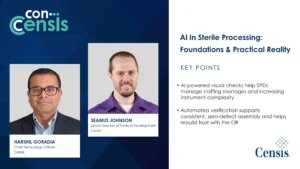The Unique Potential of Open Federated Learning in Healthcare
Historically, people have opted into research, shared their health data, or taken part in patient surveys. Data had to be collected in a central location with the consent of the users. These paths keep private information protected but unfortunately, it eliminates a considerable amount of data available. However, with federated learning, it’s possible to collect confidential information, maintain anonymity, and increase data quality. Intel’s Morgan Andersen spoke with Andrew Lamkin, Software Product Manager, and Patrick Foley, the Lead Architect of OpenFL, to discuss a groundbreaking use case of Open Federated Learning (OFL) and the exciting potential of the model. “This goes a little different than our other technologies at Intel, as it is an open-source one,” said Andersen.
OpenFL is a federated learning model. Google introduced federated learning in 2017 to improve text prediction without taking identifying information from Android users (Open Zone). “The short of it is that federated learning deals with sending the model to where the data resides, out at the edge, instead of sending data to a central place for the purpose of training,” said Foley.
Intel collaborated with the University of Pennsylvania and applied federated learning to healthcare. The use case applied explicitly to brain tumors, identifying the lines of the tumors, and determining which ones were operable and inoperable. The study brought in 71 research institutions from around the world. “these models were able to identify operable tumor regions 33 percent better than a model that was trained on public data alone,” said Foley. The study was instrumental in proving that the model was effective in medical research and that it protected patient information.
Python is at the core of OpenFL. “The project, very early on, had the realization of ‘your main customers are data scientists,’ right? So meeting them where they are and in the tool sets that they work, was really kind of crucial to getting things going and being as fast and sot of as robust as things are today,” said Lamkin. Python is used widely in deep learning, ideal use for OpenFL. OpenFL also links to Jupiter Notebook, where models are developed. With enough demand, Intel’s OpenFL could grow to work with additional programs. “There’s really only a few multinational companies that could really attempt to centralize all the data sets. I mean that have a presence in enough hospitals, that have a presence globally, at a global scale to put it all together,” said Lamkin. Five years ago, the option to source data on this scale was impossible. With OpenFL, researchers have a remarkable ability to develop insights from confidential data in all industries.
Learn more about OpenFL by visiting the OpenFL Github and joining the OpenFL Slack Community or connecting with Andrew Lamkin and Patrick Foley on LinkedIn. Don’t forget to subscribe to this channel on Apple Podcasts, Spotify, and Google Podcasts to hear more from the Intel Health and Life Sciences at the Edge.









